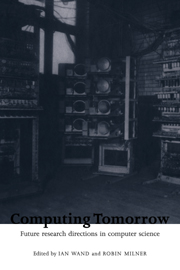Book contents
- Frontmatter
- Contents
- Preface
- Contributors
- 1 The Complexity of Algorithms
- 2 Building Novel Software: the Researcher and the Marketplace
- 3 Prospects for Artificial Intelligence
- 4 Structured Parallel Programming: Theory meets Practice
- 5 Computer Science and Mathematics
- 6 Paradigm Merger in Natural Language Processing
- 7 Large Databases and Knowledge Re-use
- 8 The Global-yet-Personal Information System
- 9 Algebra and Models
- 10 Real-time Computing
- 11 Evaluation of Software Dependability
- 12 Engineering Safety-Critical Systems
- 13 Semantic Ideas in Computing
- 14 Computers and Communications
- 15 Interactive Computing in Tomorrow's Computer Science
- 16 On the Importance of Being the Right Size
- References
- Index
Preface
Published online by Cambridge University Press: 10 December 2009
- Frontmatter
- Contents
- Preface
- Contributors
- 1 The Complexity of Algorithms
- 2 Building Novel Software: the Researcher and the Marketplace
- 3 Prospects for Artificial Intelligence
- 4 Structured Parallel Programming: Theory meets Practice
- 5 Computer Science and Mathematics
- 6 Paradigm Merger in Natural Language Processing
- 7 Large Databases and Knowledge Re-use
- 8 The Global-yet-Personal Information System
- 9 Algebra and Models
- 10 Real-time Computing
- 11 Evaluation of Software Dependability
- 12 Engineering Safety-Critical Systems
- 13 Semantic Ideas in Computing
- 14 Computers and Communications
- 15 Interactive Computing in Tomorrow's Computer Science
- 16 On the Importance of Being the Right Size
- References
- Index
Summary
Computing has developed at an extraordinary pace since Alan Turing's crucial discovery in 1936. Then we had log tables, slide rules, filing cabinets, the postal service and human clerks. Now we have computers which will calculate at unimagined rates, vast data bases and global electronic communication. We are swamped with information which can be used in countless ways. The resulting impact of computing technology on society, both at work and at play, has been profound - some say it has transformed the nature of society itself. The revolution shows no sign of abating. But are there technical obstacles in our way which must be cleared in order to enhance our progress? And what conceptual advances are needed if we are to place the revolution on a firm scientific footing? Indeed, what are the major research issues confronting computing today?
The United Kingdom has been a major innovator in computing. The first stored-program digital computer ran in the UK. Many of the crucial ideas in computer architecture and programming came subsequently from researchers in this country. Over the last fifteen years, partly spurred on by publically-funded programmes such as Alvey, and partly driven by the promise of commercial exploitation, the volume of computing research has risen dramatically. Results have poured out into books, journals and conference proceedings. The atmosphere surrounding computing research has reflected the excitement of making crucial, formative discoveries. The subject has raced ahead.
This book brings together of the views of a distinguished group of Computer Scientists from the United Kingdom. The editors asked each contributor to set out the research position in his chosen subject and then to outline the important research problems that his subject now faced.
Information
- Type
- Chapter
- Information
- Computing TomorrowFuture Research Directions in Computer Science, pp. vii - viiiPublisher: Cambridge University PressPrint publication year: 1996
